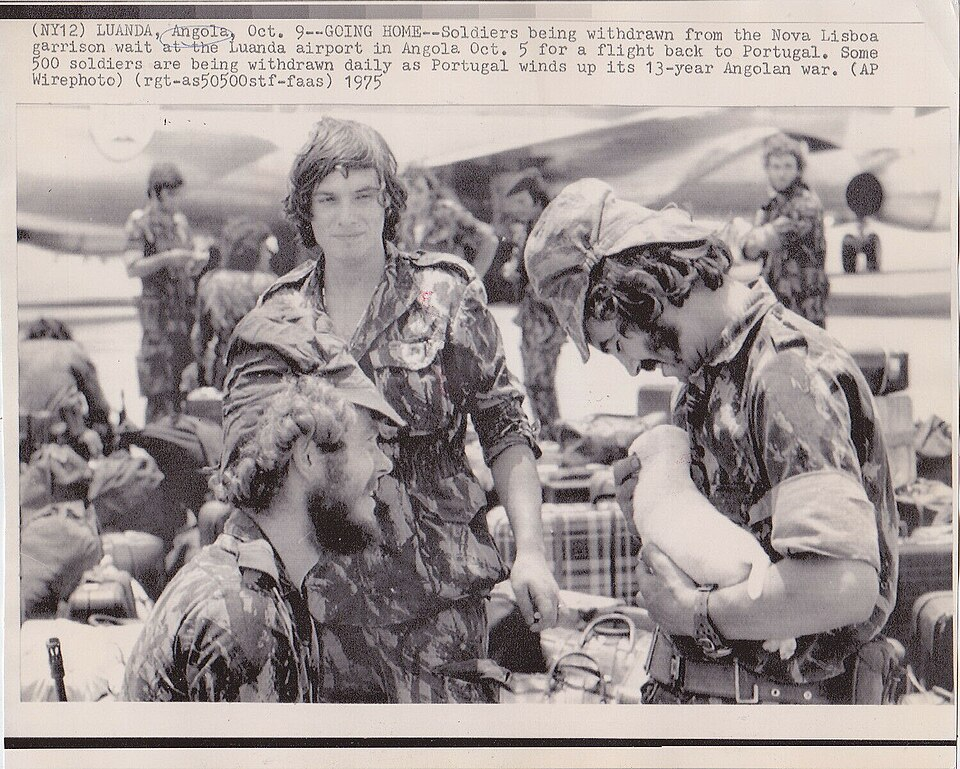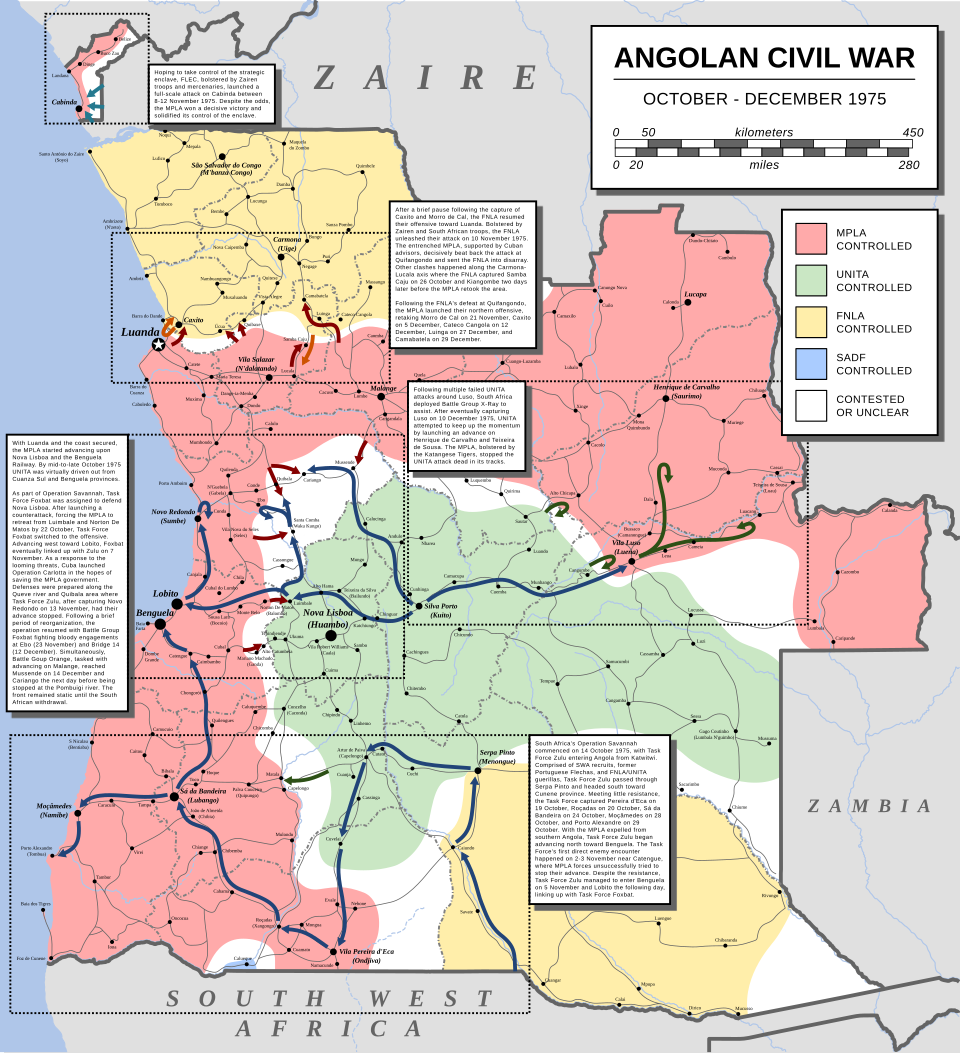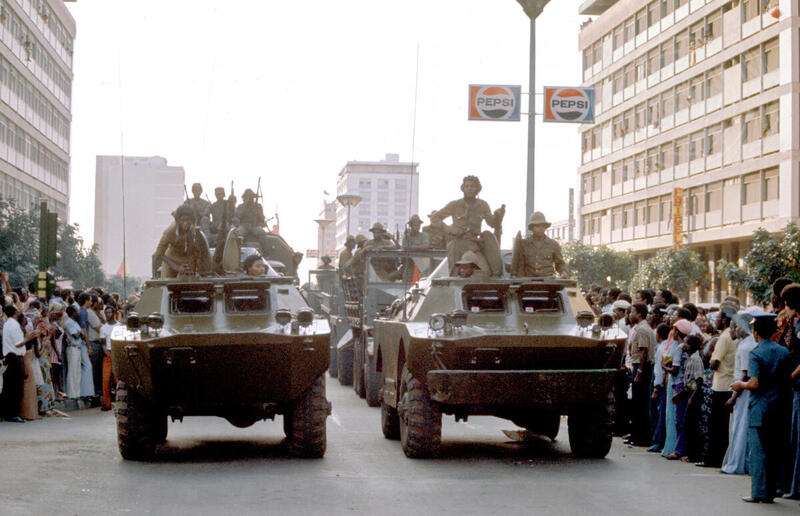IB Syllabus focus:
'Explore Angola’s struggle for independence, focusing on the liberation war, key actors like the MPLA and UNITA, and the road to independence in 1975.'
The struggle for independence in Angola was a complex process characterised by internal political strife and significant foreign intervention. The primary actors, the MPLA (People's Movement for the Liberation of Angola) and UNITA (National Union for the Total Independence of Angola), had divergent ideologies and support systems, which were instrumental in shaping the country's path to independence.
Historical Context and Colonial Rule
Portuguese colonisation: Angola was a Portuguese colony from the 16th century, facing exploitation and racial segregation.
Forced labour and land policies: Colonial authorities imposed forced labour (chibalo) and allocated prime land to Portuguese settlers, displacing Angolan families.
Cultural and political repression: The Portuguese regime suppressed Angolan culture, languages, and political dissent, fostering a climate ripe for resistance.
Early Resistance and the Emergence of Nationalist Groups
MPLA (People's Movement for the Liberation of Angola)
Formation and ideology: The MPLA formed in December 1956, merging several nationalist groups, advocating for a Marxist-Leninist governance model.
Leadership: Agostinho Neto, a pre-eminent figure, became the voice of the MPLA, articulating the aspirations for a socialist Angola.
Base of support: Attracting intellectuals and urban workers, the MPLA's stronghold was in and around Luanda and the northern provinces.
UNITA (National Union for the Total Independence of Angola)
Origins: UNITA was founded in March 1966 by Jonas Savimbi, breaking away from the FNLA due to ideological differences.
Ideological shift: Initially adopting Maoist principles, UNITA later pivoted towards an anti-communist stance to secure foreign support.
Support base: UNITA drew its primary backing from the Ovimbundu ethnic group and fostered a network of support in rural areas.
Rise of the Nationalist Movement
Urban discontent: Rising urbanisation led to an educated Angolan elite who were increasingly disgruntled with colonial policies.
Ethnic and regional differences: Various ethnic groups sought to protect their interests, sometimes aligning with different nationalist factions.
The Liberation War (1961–1974)
Beginnings of the Armed Struggle
Trigger events: The 1961 attack on a prison in Luanda by MPLA sympathisers, and the uprising in the north by the FNLA, marked the beginning of the armed struggle.
Portuguese military response: Portugal responded with a heavy military presence, leading to widespread human rights abuses.
Key Military Engagements and Strategies
MPLA: Conducted hit-and-run guerrilla tactics, focusing on sabotage and mobilising the urban population.
UNITA: Engaged in rural guerrilla warfare, often ambushing Portuguese convoys and recruiting local peasantry.
International Involvement and Influence
Soviet and Cuban support: The MPLA received substantial support from the USSR and Cuban troops, including military training and arms.
US and South African aid to UNITA: In the context of the Cold War, the United States and apartheid South Africa provided UNITA with military aid to counter the spread of communism in Southern Africa.
The Path to Independence
The Fall of Portuguese Dictatorship
Carnation Revolution: The 1974 military coup in Portugal led to a regime change and the acceleration of decolonisation processes.

Demobilized Portuguese soldiers at Luanda airport in 1975, awaiting return as colonial rule winds down after Portugal’s 1974 Carnation Revolution. The image illustrates the rapid decolonization that created the opening for Angola’s contested transition. Source
Alvor Agreement and its Breakdown
Transitional government plan: The Alvor Agreement intended to establish a coalition government until elections could be held.
Failure and resumption of conflict: Disagreements among the three nationalist movements (MPLA, UNITA, FNLA) led to the collapse of the agreement and the resurgence of civil war.

Map of territorial control in Angola (Oct–Dec 1975): the MPLA holds Luanda and most of the coast, UNITA the Central Plateau, and the FNLA much of the north, as independence nears. This visual clarifies how competing movements positioned themselves after the Alvor Agreement collapsed. Some minor locations and unit movements shown exceed the detail required by the syllabus but aid geographic orientation. Source
Declaration of Independence (1975)
Independence: On 11 November 1975, Angola declared independence amidst conflict, without a stable government in place.

MPLA troops ride amphibious armored vehicles in Luanda during the independence-day parade on 11 November 1975. The image underscores the MPLA’s control of the capital at the moment of proclamation and the militarized context of state birth. Source
MPLA's control: The MPLA, with its stronghold in Luanda, unilaterally declared the establishment of the People's Republic of Angola and Agostinho Neto as its president.
Post-Independence Challenges
The Ensuing Civil War
Continued conflict: The lack of a clear power structure led to a civil war between the MPLA and UNITA that lasted until 2002.
Impact on civilians: The prolonged warfare resulted in a humanitarian crisis, with displaced populations and a significant toll on human life.
International Dynamics Post-Independence
Cold War backdrop: The civil war in Angola continued to be a Cold War proxy battle, with the MPLA backed by the Soviet bloc and UNITA by the US and South Africa.
Cuban and South African involvement: Cuban forces remained in Angola to support the MPLA, while South Africa invaded Angola several times to weaken the MPLA and support UNITA, fearing the spread of communism near its borders.
Impact and Historical Significance
Humanitarian Impact
Loss of life: The war claimed thousands of lives, both military and civilian.
Displacement: Millions of Angolans were internally displaced or became refugees in neighbouring countries.
Political Repercussions
One-party state: The MPLA established a one-party state that lasted until multi-party elections in the 1990s.
International recognition: Many Western and African nations were slow to recognise the MPLA government due to its Marxist-Leninist orientation.
Economic Aftermath
Destruction and dependency: The prolonged conflict destroyed Angola's infrastructure and led to a reliance on oil and diamonds for economic survival.
Lasting Effects on Angola and Africa
Angola's independence inspired other colonial territories in Africa to seek self-determination.
The civil war served as a cautionary tale of the complexities that can follow independence, especially in states with multiple competing factions and significant external influence.
In studying Angola's road to independence, IB History students should examine not only the internal dynamics but also the broader international context that influenced the course of the country's struggle. The Angolan example provides valuable insights into the nature of post-colonial African politics and the enduring legacy of colonialism.
FAQ
The discovery and exploitation of natural resources in Angola, notably oil and diamonds, had a significant impact on the independence movement. These resources provided the financial means for the Portuguese to invest heavily in military operations to maintain control over the territory. However, the potential wealth from these resources also became a point of contention among the nationalist groups, each aiming to control them post-independence. The MPLA, in particular, used the promise of wealth distribution from these resources to gain support from the populace and from international allies. The presence of valuable resources contributed to the intense international interest in Angola's independence movement and subsequently fuelled the civil war, as control over these resources meant not just political power but considerable economic might.
The Portuguese Colonial War, which began in Angola in 1961, significantly impacted the colony's path to independence. The war was costly for Portugal in terms of both finances and morale. As conscripted soldiers from Portugal were sent to fight in its African colonies, dissent and war-weariness grew back home. This unrest eventually contributed to the Carnation Revolution of 1974 in Portugal, leading to a change in government and the dismantling of the Portuguese Empire. The new Portuguese regime, keen to divest itself from colonial entanglements, accelerated the decolonisation process, which directly led to Angola's independence. However, the war also hardened divisions among the Angolan factions and left a legacy of violence and militarisation that affected the country long after independence.
The OAU (Organisation of African Unity), established in 1963, played a somewhat ambivalent role in Angola's struggle for independence. On one hand, the OAU provided a platform for Angolan nationalist movements to gain legitimacy and support from other African nations. It strongly advocated for the end of colonial rule in Africa and lobbied for international recognition of the independence movements.
On the other hand, the organisation was often divided on which faction to support in Angola, reflecting broader continental divides between Anglophone and Francophone countries, and between those aligned with the East or West during the Cold War. Despite these divisions, the OAU's overall push for decolonisation and its political support did apply pressure on Portugal and contributed to the momentum for independence across the continent, which had a cascade effect on the colonies, including Angola.
Angola's ethnic composition had a profound influence on the struggle for independence. The MPLA was primarily supported by the Mbundu and the mestiço (mixed European and African) populations, and its leadership reflected these ethnicities. This base was centred around the capital, Luanda, and the coastal regions where these groups were predominant.
UNITA, by contrast, was chiefly backed by the Ovimbundu, the largest ethnic group in Angola, located in the central highlands. UNITA's leader, Jonas Savimbi, was an Ovimbundu, and the movement was adept at leveraging traditional authority structures in rural areas to their advantage.
These ethnic alignments influenced the geographic strongholds of the different movements and fed into the tensions that would continue into the post-independence period. The reliance on ethnic allegiances contributed to the polarisation of Angolan society and set the stage for the long and protracted civil war that followed independence.
The MPLA (People's Movement for the Liberation of Angola) was founded on Marxist-Leninist principles, envisioning an independent Angola with a socialist government. This ideology aligned with the Soviet Union's global stance, leading to support in the form of military and advisory aid from the USSR and Cuba. The MPLA's methods were characterised by urban guerrilla warfare and mobilising the proletariat.
UNITA (National Union for the Total Independence of Angola), on the other hand, although initially Maoist reflecting Chinese communist ideology, shifted towards a more capitalist and anti-communist stance to garner support from the United States and South Africa. This ideological pivot influenced UNITA's methods, which leaned towards conventional guerrilla warfare in rural areas and gaining support from the peasantry.
The contrasting ideologies resulted in different sources of international support, tactics, and ultimately, the areas within Angola where they held sway. MPLA's socialist leanings were more urban-centric, while UNITA's approach was rural and included traditional Angolan societal structures.
Practice Questions
The external forces played a pivotal role in Angola's struggle for independence, with the superpowers of the Cold War era greatly influencing the outcome. The Soviet Union and Cuba backed the MPLA, providing military aid and training, which was crucial in enabling the MPLA to sustain its campaign against Portuguese colonial forces and later against internal rivals. Conversely, UNITA received support from the United States and South Africa, reflecting the Cold War dichotomy and the West's fear of a growing communist influence in Africa. This external intervention not only prolonged the conflict but also influenced the political and ideological direction of the newly independent Angolan state.
The Alvor Agreement was significant in the process of Angola achieving independence as it represented the initial transition framework for a post-colonial state. It marked the first time that Portuguese authorities and Angolan nationalist movements (MPLA, FNLA, and UNITA) agreed on a shared vision for an independent Angola, proposing a coalition government and a timetable for elections. However, the agreement's collapse underscored the incompatibility of the factions and set the stage for the ensuing civil war. Its breakdown highlighted the complexities of transitioning from colonial rule to independence, particularly in a context of intense internal divisions and external Cold War pressures.

